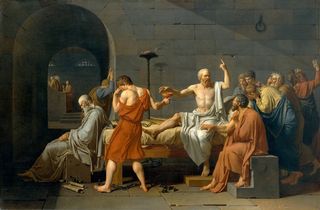
Why I Teach Poetry and Opera to Medical Students (Op-Ed)

This article was originally published on The Conversation. The publication contributed this article to Live Science's Expert Voices: Op-Ed & Insights.
Do not go gentle into that good night, Old age should burn and rave at close of day; Rage, rage against the dying of the light.
I usually begin my end of life ethics lecture with one of Dylan Thomas' best-loved poems. Sometimes I opt for something from the treasure trove of Shelley, Dickinson, or Rilke and on occasion I plump for a gem from Shakespeare’s ample store of musings on mortality. But for a proud Welshman from Dylan’s home town I usually raise the curtain by raging against the dying of the light.
Composers and artists often get a look-in later in the lecture. French master David’s potent Death of Socrates usually makes an appearance and the sonorous tones of Purcell’s Funeral Music for Queen Mary occasionally get a hearing. It’s not all high brow. I frequently rely on the Dead Parrot Sketch to lighten the mood. The sketch also helps me illustrate a technical point about the metaphysics of medico-legal definitions of brain stem death.
Clinicians and academics teach humanities to medical students for a number of different reasons. For some the primary goal is to develop students' capacities for empathy and compassion. For others the main aim is to develop students' self-awareness and self-understanding and to enable them to grow and flourish.
Specific forms of art are also taught because they can improve specific clinical skills. Literature facilitates learning about narrative competence, sculpting develops physical dexterity and the analysis of art hones the power of observation and interpretation. Discussing film might even improve moral reasoning and increase ethical sensitivity.
Art, literature and film can also remind us that ethics is subtle, ambiguous and uncertain. In my experience medical students often struggle with that. They want clarity when clarity is the antithesis of the ethical reality. Stories can help them see that moral reductionism often fails to shine a lucid light on inherently muddy matters.
Judicious use of the humanities can also help students understand core ethical concepts and remember key legal facts. I have lost track of the number graduates who have told me that a poem or a passage from a novel has helped them fathom a philosophical idea. Some of them even quote literary experts in their exam papers. A few (rather cheekily) add a little note to inform me that their answers were inspired by the muses.
Sign up for the Live Science daily newsletter now
Get the world’s most fascinating discoveries delivered straight to your inbox.
In the teaching sessions themselves, poetry and music can serve to create the right atmosphere. For example, Donne’s No Man is an Island nicely sets the emotional scene at the beginning of a lecture about global health and Violetta’s Aria from Verdi’s La Traviata does the same when lecturing about Notifiable Diseases such as tuberculosis. Poetry and music can also provide hope. I often teach about patient safety and the ramifications for patients and professionals when medical errors occur. This can be quite distressing. But Pope helps me reassure students that patients usually forgive mistakes as long as doctors are honest and humble.
I am well aware that some students are left cold by my artistic choices. However, a light sprinkling of the humanities never hurt anyone and since I deliver lectures more ebulliently when I indulge in a bit of what I love along the way the poetry is likely to stay.
So how to end this piece on the use of humanities in medical ethics education? I was tempted to bring matters to a close with some Welsh-language poetry, for there is nothing quite so wondrous to those who can understand. But in the end I thought it wiser to bring the curtain down with a bit more Dylan. Enjoy.
And death shall have no dominion. Dead man naked they shall be one With the man in the wind and the west moon; When their bones are picked clean and the clean bones gone, They shall have stars at elbow and foot; Though they go mad they shall be sane, Though they sink through the sea they shall rise again; Though lovers be lost love shall not; And death shall have no dominion. And death shall have no dominion. Under the windings of the sea They lying long shall not die windily; Twisting on racks when sinews give way, Strapped to a wheel, yet they shall not break; Faith in their hands shall snap in two, And the unicorn evils run them through; Split all ends up they shan’t crack; And death shall have no dominion. And death shall have no dominion. No more may gulls cry at their ears Or waves break loud on the seashores; Where blew a flower may a flower no more Lift its head to the blows of the rain; Though they be mad and dead as nails, Heads of the characters hammer through daisies; Break in the sun till the sun breaks down, And death shall have no dominion.
This article was originally published on The Conversation. Read the original article. Follow all of the Expert Voices issues and debates — and become part of the discussion — on Facebook, Twitter and Google +. The views expressed are those of the author and do not necessarily reflect the views of the publisher. This version of the article was originally published on Live Science.
Most Popular

